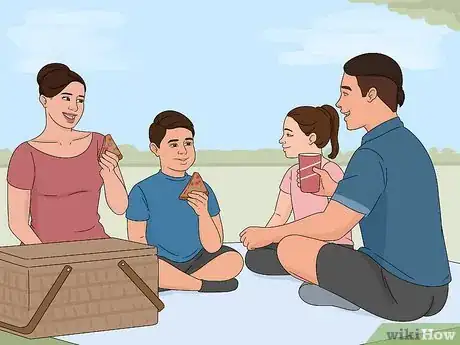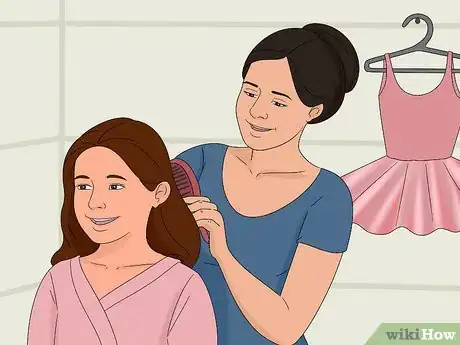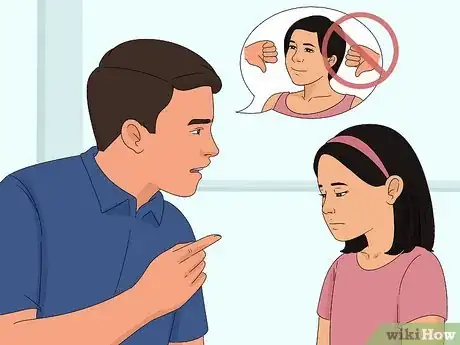This article was co-authored by Tara Vossenkemper, PhD, LPC and by wikiHow staff writer, Danielle Blinka, MA, MPA. Dr. Tara Vossenkemper is a Licensed Professional Counselor and the Founder and Managing Director of The Counseling Hub, LLC, a group counseling practice located in Columbia, Missouri. She is also the Founder of and a Business Consultant with Tara Vossenkemper Consulting, LLC, a consulting service for therapy practice owners. With over nine years of experience, she specializes in using the Gottman Method of relationship therapy with couples on the brink of divorce, who have conflict, or who feel disconnected from one another. Dr. Vossenkemper holds a BA in Psychology from The University of Missouri, Saint Louis, an MA in Counseling from Missouri Baptist University, and a PhD in Counselor Education and Supervision from The University of Missouri, Saint Louis. She has also completed Level 3 training in the Gottman Method Couples Therapy approach and has been formally trained in both the Prepare-Enrich Premarital Couples Counseling approach and the PREP Approach for couples counseling.
There are 9 references cited in this article, which can be found at the bottom of the page.
This article has been viewed 19,127 times.
Blended families can be beautiful, but it usually takes time for everyone to adjust. You probably feel like you’re doing everything right but are still getting pushback from your stepchildren. This is a very common experience, and we’re here to help you. We’ll help you improve your marriage and hopefully build a better relationship with your stepchildren. While a happy household may take time, life with your blended family can start improving right away. We have the answers to your most common questions about stepchildren impacting your marriage.
Steps
Can stepchildren cause divorce?
-
1It’s possible for conflicts over stepchildren to cause a divorce. You’re probably feeling really insecure in your relationship right now, but don’t lose hope. It’s true that conflicts between stepchildren and step parents can cause a lot of turmoil in a household. In some cases, this might cause fights with your partner, but talking about your concerns can help.[1] Tell your partner if you notice these common problems:
-
2It’s very unlikely that your stepchildren will break up your marriage. Just focus on building a strong foundation for your relationship. Lots of couples struggle to have a strong marriage, especially when they have a blended family. Take time for just you and your partner because a happy marriage actually benefits the entire family.[4]
- Start by talking to your partner. Say, “Lately, our relationship hasn’t seemed as strong as it was in the past. I love you so much, so I want us to start prioritizing our marriage.”
- Schedule time for your partner to spend alone with you, as well as time they can spend with the children. It’s normal for you and your stepchildren to feel a little jealous over who gets to spend time with your partner. All of you need time and attention.
How do I survive a marriage with stepchildren?
-
1Make your marriage your top priority. Children are extremely important, so it’s normal to feel like you need to focus on their needs. At the same time, a healthy marriage will create a healthy household. Schedule time to spend alone with your partner so your relationship is strong. Additionally, be there to meet each others’ needs.[5]
- Spend time alone together as a couple every day, even if it’s just 20 to 30 minutes.
- Go on a weekly date night so you have time away from the children.
- Remember that you are partners for life. Your children will grow up and leave the home, but you’ll always have each other.
-
2Spend time together both as a couple and as a family. You need couples’ time to build a strong marital bond. Similarly, family time will create a stronger bond between all of your blended family members. Set aside a date night every week so you and your partner can focus on each other. Additionally, plan family events on a weekly or biweekly basis, depending on your custody schedule. Focus on having fun so you can make great memories together.[6]
- If you share custody with a co-parent, plan date nights or a couple’s getaway on your kid-free weekends. If you have children in your home full-time, get a babysitter once a week so you can go out or plan a late night date at home after the kids go to bed.
- If your partner has primary or full custody, plan something fun every weekend, like playing mini golf, going to the park, playing board games, going bowling, or going to a pizza restaurant.
- If your partner has visits every other weekend, do a fun family event each time they come over.
-
3Create a united front when it comes to rules and discipline. Rules and discipline are a big cause of issues in a blended family. Your stepchildren may not see you as a parental figure yet, so enforcing rules can be hard. As a family, create a set of rules and consequences for all of the children in your household. In the beginning, it’s best for you to discipline your kids, while your partner discipline’s theirs.[7]
- You could tell your partner, “I’m having a lot of trouble enforcing the rules when you’re not around. I think it’s best for you to be the disciplinarian until the kids start seeing me as a parent.”
- For instance, you might agree that the kids will treat others nicely, will use respectful language, and will respect other people’s property. If your stepchild says a curse word to you, say something like, “Remember what your dad said about using respectful language?” Leave it there and let your partner handle it when they come home.
- Once your stepchildren view you as a parental figure, you’ll likely be able to take on a disciplinary role. In general, it usually takes 3 to 5 years for stepchildren to fully accept you as a parent. If they were teens when you married their parent, it may be more difficult for them to see you this way.[8]
Why don’t my stepchildren like me?
-
1Your stepchildren are probably upset that their family split up. Try to put yourself in their shoes for a moment. Going through a divorce, changing homes, and adjusting to a whole new family are all super difficult experiences. It’s totally normal for them to feel upset and angry right now. Since you’re a new addition to their life, you make an easy target for all of this pain. Try not to take their words and behaviors personally.[9]
- It really hurts to have your stepchildren treat you poorly. Sometimes, you can be a kind, amazing step parent, and they will still act like they hate you. Try to remember that they are just hurting.
- If your stepchildren are very young, invite them to play with you and just try to be their friend. With teens, ask them to take part in planning how your household will run so they feel involved. If your stepchildren are adults, try to approach them as a friend, not as a step parent.
-
2Your stepchildren likely feel afraid and powerless right now. You probably feel powerless to change your stepchildren, and it’s likely they feel the same way about your marriage. They didn’t have a choice on their parents breaking up or on your partner’s decision to choose you. They’re now members of a new blended family, and they can’t do anything about it.[10]
- Give your stepchildren time to process what’s going on in their lives. It’s common for people in your shoes to have really high expectations for their new blended family, but this isn’t realistic. Don’t expect your stepchildren to get on board with your new family right away.
How do I improve my relationship with a stepchild?
-
1Take the time to get to know your stepchild. You and your stepchildren can develop a wonderful bond over time. Invite them to do fun things with you, and take an interest in their life. They might refuse to spend time with you at first, but keep trying. Eventually, they’ll realize that you care about them and will give you a chance.[11]
- For younger kids, focus on play and fun. You could say, “I saw that Build-a-Bear just got your favorite character. Do you want to go build one today?” or “I like your doll house. Can we play with it together?”
- If your stepchildren are teens, be involved in their life. You could say, “Your dad said you’re going to your first dance this weekend. Do you need help getting ready?” “Hey, your mom said you got a role in the school play. Did you want me to help you practice?” or “You seem really upset today. Do you want to talk about it?”
- For adult stepchildren, try to be a friend. You might say, “Do you want to grab coffee this weekend?” or “The museum just opened a new exhibit. Do you want to go together?”
-
2Act as a friend instead of a disciplinarian. If you’re struggling with discipline, you’re not alone. It’s a very thorny issue for most step parents. Generally, it’s best to lay off discipline when you’re a step parent. Instead, just have fun with your stepchildren and be there as a confidant when they need to talk. When problems arise, let your partner handle them.[12]
- If your stepchild is breaking a rule, say something like, “You know your mother doesn’t want people eating in the living room. We all need to respect the house rules.” Leave it at that. Then, talk to your partner about what happened.
- If you become a step parent to a very young child, they may accept you as a parental figure after a few years. At that point, you might start disciplining them.[13]
-
3Be kind and respectful toward your stepchildren. You and your stepchildren both deserve kindness and respect. Unfortunately, it may take a while for them to come around. Just continue being the best step parent you can be. In most cases, this will help you form a solid relationship with them.[14]
- Even if your stepchildren never treat you well, continuing to give them kindness and respect will show your partner that you’re trying. This will at least help you strengthen your marriage.
How do I help siblings in blended families get along?
-
1Treat all of the children in the home equally. Your children have always been your priority, so it’s normal for you to want to focus on their needs right now. Unfortunately, this sometimes leads to conflict because your stepchildren may feel left out. Work with your partner to ensure that all children in the home have the same rules, feel included, and feel heard.[15]
- Try planning fun activities as a family, like playing board games or sports, watching movies, going to amusement parks, or having a picnic.[16]
- When there’s a conflict between your children and your stepchildren, listen to all sides before you address it. Early on, you might loop your partner in to make sure all of the children feel like they’re being treated fairly.
-
2Make sure both parents spend alone time with their children. While family time is super important, parents also need bonding time with their kids. Schedule one-on-one time so the kids feel important and valued by their parents. This will remind them that their parent hasn’t forgotten about them now that they have a new partner and blended family.[17]
- For example, you might choose one Saturday a month for your partner to go out for a few hours with just their kids while you hang out with your children. Later that day, you might all do something as a family.
- Check in with your kids every so often. Ask questions like, "How is this going for you? How do you like hanging out with the other kids?"[18]
-
3Create new routines and rituals for your blended family. Children thrive when they have a routine, so creating a household schedule can really help them settle into a blended family. Additionally, family rituals and traditions are super important, so involve the kids in making new one. This will help them feel more invested in their new family.[19]
- For example, you might create routines for doing chores, coming home from school, and getting ready for bed.
- When it comes to rituals, start with things like family dinners or Saturday morning sports. Later, you can create new traditions for things like Christmas morning or Thanksgiving.
What should a step parent never do?
-
1Don't complain about their other parent around your stepchildren. Sometimes, your partner’s ex can be a total nightmare. They may even be actively doing things that are hurting your stepchildren. However, it’s harmful to the kids to hear these things. When you need to vent, talk to a friend.[20]
- This might be hard if the other parent really is doing the wrong thing. For instance, the other parent might not come get your stepchild for visits. You might listen to how your stepchild feels and offer them comfort, but keep your own opinions about their other parent to yourself.
- Find a trusted friend or family member you can vent to about the other parent. Make sure this is someone who won’t talk about what you say in front of your stepchildren.
-
2Don’t avoid family activities with your stepchildren. At first, you might feel left out when you’re doing family stuff, especially if you don’t have kids of your own. It’s totally normal to feel like this, and it will get better in time. Make an effort to participate in family games, outings, and events so you feel like part of the family.[21]
- For example, go to your stepchildren’s sporting events, attend family get-togethers, and go on family outings.
-
3Don’t discuss your concerns with your stepchildren—talk to your partner. It’s possible your stepchild is mistreating you when their parent isn’t around. Similarly, your stepchild might refuse to follow rules. If this is the case, talk to your partner about it directly. They should be the one to talk to their child.[22]
- Say, “I really want to have a great relationship with Maddie, but she’s still taking her anger out on me. She’s started calling me mean names and throws my stuff. I was hoping that you could talk to her and set some boundaries for how to treat me so that this doesn’t become a problem.”
Is it okay to not like my stepchild?
-
1It’s okay if your relationship is rocky at first. Like most step parents, you may have expected your stepchild to readily accept their new family. After all, you’re working hard to be a great step parent! Unfortunately, it usually takes a while for children to adjust. You might have a rough relationship at first, so don’t feel bad if you don’t exactly like your stepchild.[23]
- You likely already know this, but definitely don’t tell your stepchild how you feel. Children need and deserve love and affection.
-
2You don’t have to like them, but don’t give up on your stepchild. It might be hard to see this right now, but you and your stepchild may have a great, loving relationship in the future. Hang in there! Just keep trying to bond with them, and they may open up to you over time.[24]
- If your stepchildren are really young, they’ll likely bond with you eventually.
- When it comes to teens, it’s normal for them to pull away and focus on their independence. Still, they may eventually open up to you if you keep trying.
- Adult stepchildren may not ever really like you. However, you can form a respectful relationship with them that’s mutually beneficial.
When should I leave because of stepchildren?
-
1You might consider leaving if you or your children are unsafe. In rare cases, you might have a stepchild who is physically or verbally abusive toward you or your children. Unfortunately, this is a very dangerous situation. You need to prioritize your and your children’s needs. It may be best for you to remove yourself or your children from this environment.[25]
- Talk to your partner if you’re feeling unsafe. Say, “When you’re not around, Cameron punches and kicks me. Look at these bruises. I don’t want to give up on us, but I may have to move out if this abuse continues.”
-
2Try talking to a therapist before you leave. Being a step parent is super hard, and sometimes you need extra help. A therapist can help you process your emotions and adjust to your new role. They can also help you and your partner communicate better and build a stronger marriage. Try meeting with a counselor if you’re feeling like leaving.[26]
- Your therapy sessions may be covered by insurance.
Expert Q&A
-
QuestionHow do you make a blended family successful?
 Tara Vossenkemper, PhD, LPCDr. Tara Vossenkemper is a Licensed Professional Counselor and the Founder and Managing Director of The Counseling Hub, LLC, a group counseling practice located in Columbia, Missouri. She is also the Founder of and a Business Consultant with Tara Vossenkemper Consulting, LLC, a consulting service for therapy practice owners. With over nine years of experience, she specializes in using the Gottman Method of relationship therapy with couples on the brink of divorce, who have conflict, or who feel disconnected from one another. Dr. Vossenkemper holds a BA in Psychology from The University of Missouri, Saint Louis, an MA in Counseling from Missouri Baptist University, and a PhD in Counselor Education and Supervision from The University of Missouri, Saint Louis. She has also completed Level 3 training in the Gottman Method Couples Therapy approach and has been formally trained in both the Prepare-Enrich Premarital Couples Counseling approach and the PREP Approach for couples counseling.
Tara Vossenkemper, PhD, LPCDr. Tara Vossenkemper is a Licensed Professional Counselor and the Founder and Managing Director of The Counseling Hub, LLC, a group counseling practice located in Columbia, Missouri. She is also the Founder of and a Business Consultant with Tara Vossenkemper Consulting, LLC, a consulting service for therapy practice owners. With over nine years of experience, she specializes in using the Gottman Method of relationship therapy with couples on the brink of divorce, who have conflict, or who feel disconnected from one another. Dr. Vossenkemper holds a BA in Psychology from The University of Missouri, Saint Louis, an MA in Counseling from Missouri Baptist University, and a PhD in Counselor Education and Supervision from The University of Missouri, Saint Louis. She has also completed Level 3 training in the Gottman Method Couples Therapy approach and has been formally trained in both the Prepare-Enrich Premarital Couples Counseling approach and the PREP Approach for couples counseling.
Licensed Professional Counselor Slowly get your and your partner's families used to one another. Start by meeting with your partner and your partner's children; then, invite your partner to meet with you and your children. Make both meetings as transparent as possible, and encourage the kids to discuss their questions, concerns, and fears.
Slowly get your and your partner's families used to one another. Start by meeting with your partner and your partner's children; then, invite your partner to meet with you and your children. Make both meetings as transparent as possible, and encourage the kids to discuss their questions, concerns, and fears. -
QuestionHow do I build a relationship with my partner's kid?
 Tara Vossenkemper, PhD, LPCDr. Tara Vossenkemper is a Licensed Professional Counselor and the Founder and Managing Director of The Counseling Hub, LLC, a group counseling practice located in Columbia, Missouri. She is also the Founder of and a Business Consultant with Tara Vossenkemper Consulting, LLC, a consulting service for therapy practice owners. With over nine years of experience, she specializes in using the Gottman Method of relationship therapy with couples on the brink of divorce, who have conflict, or who feel disconnected from one another. Dr. Vossenkemper holds a BA in Psychology from The University of Missouri, Saint Louis, an MA in Counseling from Missouri Baptist University, and a PhD in Counselor Education and Supervision from The University of Missouri, Saint Louis. She has also completed Level 3 training in the Gottman Method Couples Therapy approach and has been formally trained in both the Prepare-Enrich Premarital Couples Counseling approach and the PREP Approach for couples counseling.
Tara Vossenkemper, PhD, LPCDr. Tara Vossenkemper is a Licensed Professional Counselor and the Founder and Managing Director of The Counseling Hub, LLC, a group counseling practice located in Columbia, Missouri. She is also the Founder of and a Business Consultant with Tara Vossenkemper Consulting, LLC, a consulting service for therapy practice owners. With over nine years of experience, she specializes in using the Gottman Method of relationship therapy with couples on the brink of divorce, who have conflict, or who feel disconnected from one another. Dr. Vossenkemper holds a BA in Psychology from The University of Missouri, Saint Louis, an MA in Counseling from Missouri Baptist University, and a PhD in Counselor Education and Supervision from The University of Missouri, Saint Louis. She has also completed Level 3 training in the Gottman Method Couples Therapy approach and has been formally trained in both the Prepare-Enrich Premarital Couples Counseling approach and the PREP Approach for couples counseling.
Licensed Professional Counselor Meet with the child individually without your partner being there. Plan a fun activity to do with them, so you and your partner's child have a positive shared experience together.
Meet with the child individually without your partner being there. Plan a fun activity to do with them, so you and your partner's child have a positive shared experience together.
Warnings
- Don’t favor your own children over your stepchildren. All children need to feel loved, valued, and heard in their family.[30]⧼thumbs_response⧽
References
- ↑ https://www.psychologytoday.com/us/blog/surviving-your-childs-adolescence/200909/remarriage-adolescents-the-perils-step-relationship
- ↑ https://www.helpguide.org/articles/parenting-family/step-parenting-blended-families.htm
- ↑ https://www.apa.org/monitor/dec05/stepfamily
- ↑ https://www.helpguide.org/articles/parenting-family/step-parenting-blended-families.htm
- ↑ https://www.apa.org/monitor/dec05/stepfamily
- ↑ https://www.helpguide.org/articles/parenting-family/step-parenting-blended-families.htm
- ↑ https://childmind.org/article/navigating-the-challenges-of-stepfamily-life/
- ↑ https://childmind.org/article/navigating-the-challenges-of-stepfamily-life/
- ↑ https://www.helpguide.org/articles/parenting-family/step-parenting-blended-families.htm
- ↑ https://childmind.org/article/navigating-the-challenges-of-stepfamily-life/
- ↑ https://www.helpguide.org/articles/parenting-family/step-parenting-blended-families.htm
- ↑ https://www.survivedivorce.com/step-parenting
- ↑ https://childmind.org/article/navigating-the-challenges-of-stepfamily-life/
- ↑ https://www.helpguide.org/articles/parenting-family/step-parenting-blended-families.htm
- ↑ https://www.helpguide.org/articles/parenting-family/step-parenting-blended-families.htm
- ↑ Tara Vossenkemper, PhD, LPC. Licensed Professional Counselor. Expert Interview. 27 October 2021.
- ↑ https://www.helpguide.org/articles/parenting-family/step-parenting-blended-families.htm
- ↑ Tara Vossenkemper, PhD, LPC. Licensed Professional Counselor. Expert Interview. 27 October 2021.
- ↑ https://childmind.org/article/navigating-the-challenges-of-stepfamily-life/
- ↑ https://kidshealth.org/en/parents/stepparent.html
- ↑ https://childmind.org/article/navigating-the-challenges-of-stepfamily-life/
- ↑ https://www.apa.org/monitor/dec05/stepfamily
- ↑ https://childmind.org/article/navigating-the-challenges-of-stepfamily-life/
- ↑ https://childmind.org/article/tips-for-blended-families/
- ↑ https://www.focusonyourchild.com/when-to-leave-because-of-stepchild/
- ↑ https://www.helpguide.org/articles/parenting-family/step-parenting-blended-families.htm
- ↑ https://www.helpguide.org/articles/parenting-family/step-parenting-blended-families.htm
- ↑ https://childmind.org/article/navigating-the-challenges-of-stepfamily-life/
- ↑ https://www.helpguide.org/articles/parenting-family/step-parenting-blended-families.htm
- ↑ https://www.helpguide.org/articles/parenting-family/step-parenting-blended-families.htm
















































































